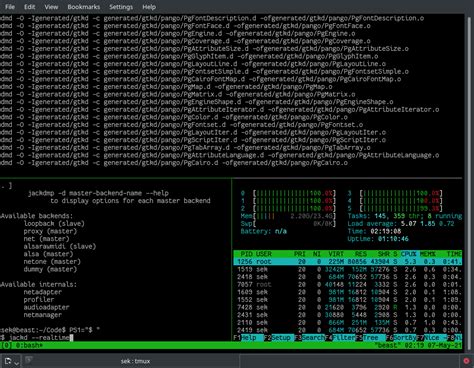In the landscape of terminal multiplexers, Tmux has reigned supreme for many developers. Yet, just as there isn’t a one-size-fits-all solution for everyone, alternatives emerging on the scene offer targeted features that might better serve specific needs. Enter Shpool, a minimalist terminal session persistence tool that specifically addresses the shortcomings some users face with Tmux. Developed and open-sourced by Google, Shpool is designed to be less intrusive and more focused compared to its robust but often complex counterparts.
Several users in the developer community have highlighted **Shpool’s primary differentiator**: it maintains an in-memory copy of terminal state that can be used to re-draw after a reconnect, ensuring you don’t lose all your scrollback history. This is in contrast to Tmux’s often criticized handling of scrollback and copy-paste functionality. This feature alone could make Shpool a game-changer for those who value seamless reconnections without any cognitive overhead.
The **simplicity of Shpool** is another point that users appreciate. Unlike Tmux, which is loaded with a plethora of features such as tiling and window splitting, Shpool keeps things straightforward by solely focusing on session persistence. This makes it a go-to choice for developers who find Tmux overwhelming or simply need a nimble tool to maintain long-running sessions without grappling with advanced configurations.
For example, **jauntywundrkind** pointed out that while tools like `dtach` and `abduco` have been viable options for lightweight re-attachable ways to run programs, the layer upon layer of terminal management can become counter-productive. Shpool resonates with users looking to eliminate this complexity. He also mentioned using Neovim on `dtach`, noting how removing multiple management layers has improved his workflow. This resonates with the philosophy behind Shpool, advocating for less complexity and more efficiency.
Similarly, other users such as **andrewla** emphasized that while tools like `dvtm` provide minimalist window management, they fall short due to the lack of session management. Shpool effectively fills this gap by separating concerns — allowing users to rely on their OS’s window management while leveraging Shpool for robust session persistence.
Moreover, the **discussion around cognitive overhead** is significant. **ethanpailes** clarified that referring to Shpool as ‘lightweight’ wasn’t a comment on its performance but rather on the cognitive load associated with picking up a new tool. Tmux requires significant configuration and tweaks, making it more suited for power users. In contrast, Shpool is designed to work out-of-the-box, making it ideal for those who might not necessarily be terminal experts but still need reliable session management.
Interestingly, the **focus on specific use-cases** highlights why Shpool could be a better fit for some users. For instance, while **Tyr42** values Tmux for its ability to survive a laptop sleep, allowing persistent sessions even through network disruptions, Shpool offers this and does not interfere with native terminal functionalities. This tool is particularly alluring for developers who run processes that demand reliable reconnections without the bells and whistles of Tmux’s more advanced features.
The question of why Shpool doesn’t try to replace Tmux entirely but instead focuses on doing one thing well — session persistence — arises from developers’ desire for **single-purpose tools**. **freedomben** mentioned that the notion of ‘bloat’ in Tmux isn’t negative but context-dependent. Developers who primarily need persistent connections might find Tmux overkill, whereas Shpool, without any unnecessary features, hits a sweet spot.
Shpool’s design philosophy also brings **security and reliability** into the spotlight. By avoiding the complex infrastructure required by Tmux, Shpool ensures that less can go wrong. One can’t help but appreciate how this tool’s limitations become its strengths. These strengths are echoed by users like **retr0id**, who emphasized Shpool’s unique approach to maintaining terminal state, ensuring no loss of scrollback — a frequent pain point for many Tmux users.
In wrapping up the discussion, it’s essential to note that while tools like Tmux and Screen have a firm standing, there’s always room for alternatives like Shpool to coexist, each filling niche requirements effectively. Whether you’re a seasoned developer or someone dipping their toes into terminal multiplexers, **Shpool offers just enough without overwhelming you**. It stands as a testament to how minimalism, when executed correctly, can be the ultimate sophistication in the tool ecosystem.
Overall, Shpool is an intriguing addition to the terminal management toolkit, demonstrating how laser-focused, user-centric applications can carve out their space even amidst more feature-rich competitors. For anyone curious about trying it out, Shpool is available on GitHub at Shell Pool Shpool. This lightweight yet powerful tool promises to streamline your remote workflows, making it a worthy try for anyone grappling with session persistence challenges.


Leave a Reply